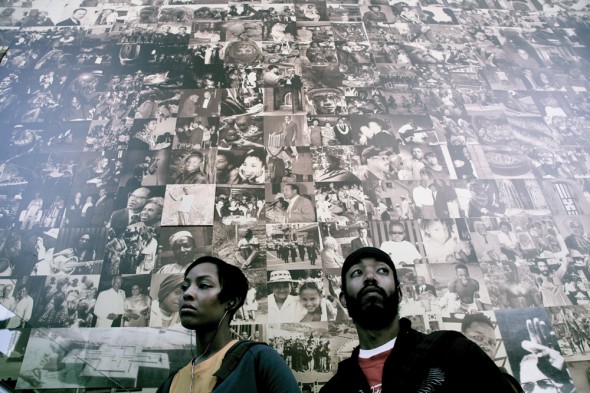
photography by lenard smith
Guided by his own compass, Wyatt Cenac divines the humor in race, identity and ultra-wealthy jackasses
There was a time when Wyatt Cenac worried that he might actually become a hobo. One might argue that he would have made a great (if not the greatest) hobo to walk the streets of Los Angeles. He’s gregarious, whip-smart funny, polite and even knows how to cut his own hair. But the thought of pursuing the hobo’s life did creep up on him once. Times were tough, work was scarce, and it didn’t help that he’s the kind of person to sacrifice any kind of personal opulence in order to follow his own artistic compass — until less than a year ago, when the 32-year-old writer, stand-up comedian and actor was dealt back into the game, and by all accounts, looks as though he’s running the table now.
Currently featured as a writer and regular correspondent on “The Daily Show with Jon Stewart,” Cenac recently starred in one of the most critically acclaimed independent films of the year. It’s a far cry from his short video skits on the internet, like Yacht Rock’s “Footloose” and “Barack Obama: Campaign Posters.” And while this 180° career change might inflate an ego to Macy’s Thanksgiving Day Parade proportions, he retains an incredible humility and sense of humor about his newfound status. At the end of the day, Cenac just values the simple things in life — a steady creative job, having plenty of rice in his cupboard and the possibility that sometime in the near future, he will have a platinum submarine and a chariot of giraffes at his disposal.
I was struck by how natural the dialogue was in Medicine for Melancholy. As a writer yourself, did you connect with that aspect of the script?
Yeah. I think a lot of it also came from working with Barry [Jenkins]. I met up with him for a quick reading and it was just a really comfortable environment. You rarely get the opportunity to talk to the writer and director so intimately.
So, the next thing you knew, you were living in San Francisco.
A couple weeks later, they called me up and asked if I wanted to do the film. I needed to live in San Francisco for a month and at the time I had no money. I suppose my poverty coincided with this opportunity. They were willing to cover my rent in la and promised to feed me for free, so it worked out.
That’s important.
Yeah, especially when you’re doing a film solely for food. As long as the food keeps coming, you keep on working. If every project I did was based solely on my lack of finances, I could wind up doing a lot of good things, but I could also wind up doing a lot of terrible things.
Given the sacrifices you’ve made over the years for your art, what do you think has kept you going?
I think it’s a fair amount of persistence, but that’s also combined with a lack of any other qualifications. I had no real skills that I could apply to the real world. I was just too old and underqualified to do anything like work in a bank or at Best Buy. I had no other option, except maybe to become a hobo.
Well, I did hear that you were a bouncer at a bowling alley between gigs in LA.
Yeah. I worked the door at a bar/bowling alley for a little while. I’m not the most intimidating person when it comes to throwing people out of places. I don’t know any martial arts to speak of. I think a lot of people assumed that I did, because I was clearly the smallest guy at the door. There was a joke that I was the “ladies bouncer,” so instead of trying to kick out a big drunk dude, I would kick out his girlfriend and hope that he would follow.
So before the film and “The Daily Show” you were in a pretty rough spot financially.
Well, right before I moved to New York, I had a friend who was a hobo. I used to see him outside the grocery store or local coffee shop all the time. I remember that as he started getting his life together, mine was falling apart. One time after being repoed, I had no money, I was on the bus, and he happened to get on and we started talking. He was like, “Oh yeah, I’m getting my shit together and someone is helping me get some money to get an apartment. I know that you’re in a rough spot. I don’t know if you would be interested in being roommates. Do you need any cash or anything?”

Wyatt Cenac in Medicine for Melancholy
That’s a bit surreal.
And for a second there it was like this weird change over. I used to throw him a couple quarters or buy him a sandwich and now he was offering to help me out. It was beautiful in one sense, but at the same time, when you as a person are towing the line between becoming a hobo and getting your shit together, you never feel like you were ever going to be in a place where a hobo was feeling sorry for you. It’s like, “Is this why I spent so much money on college?”
Medicine was your first serious acting role?
I think “Yacht Rock” was pretty serious.
Oh, of course. Your depiction of R&B singer James Ingram was incredible. I don’t understand how the Academy didn’t recognize that or at least give you a nod.
I would have liked to have won. I don’t think that I would have liked to be nominated, because they say, “It’s an honor to be nominated,” but that’s bullshit. You want to win. So I would have liked to win something.
There is light humor in Medicine, but beneath it are the complexities and volatile issues of race relations in the States. Do you think that the time you spent baring yourself in stand-up comedy helped you prepare?
I always felt that getting into comedy was a way to avoid having to deal with one’s feelings. It was probably nicer that this was such a small movie. It felt like everyone really believed in the film and wanted it to succeed. If it was a bigger budget film, I imagine I wouldn’t have had that opportunity.
You joined “The Daily Show” last year around the primaries. I couldn’t help but think that if Medicine represents dealing with the issues of race and identity on an intimate and intelligent level, then last year’s election must’ve seemed on the scale of the Titanic or some Michael Bay film. How do you locate the humor in these difficult and complex questions?
At the end of the day, I do want to find something funny within the public discourse, but at the same time, these are things that I always kind of thought about — throughout life, as a black person. I grew up in Texas and was aware of race there and then I moved to North Carolina and had a different experience in college. Even with comedy I got categorized very quickly. People want to put you on a path. You’re labeled an “urban” or “alternative” or “Latino” or something comic. I got placed in the alternative comedy track. There are not a lot of minorities or people of color in that alternative track, so race was something I definitely thought about. But at the same time, you’re thinking, “How can I make this funny, but not sound like a diatribe?”
It sounds like there is a great deal of humility involved with the path of an artist in your career. Would you say you have a deeper appreciation for the hand that you’re playing now and the opportunities that have recently come your way?
I think it’s just great to be working in this economy that we are in right now. But I’m also doing something that I always wanted to do. I know so many people who are just working jobs to get by, and I just feel lucky and fortunate to have a job that I wanted for years. I never thought it worked out that way, where the things that you want, you got. I also don’t want to fuck it up. It just so happened I did a little movie that exceeded everyone’s expectations, and then for it to coincide with getting a job at a show I’ve always loved and wanted to be a part of. For me, things are great and hopefully it can continue this way. Oh, I also want to own a platinum yacht sometime.
Yeah. I suppose that dream is always on everyone’s backburner.
I guess maybe not a platinum yacht… maybe a platinum submarine. A platinum yacht probably won’t float as well.
And maybe a couple of giraffes.
Well, giraffes hate water.
Maybe just in your backyard frolicking.
Oh I see, like a giraffe-driven chariot.
Just another one of life’s little creature comforts.
It seems like there should be some super wealthy prince from Dubai who wants to flaunt, and just go through the streets with his giraffe-driven chariot. I’m really surprised we haven’t seen that yet.
Well, you never know. When this goes to print, it might give some people a few ideas.
You know, if you put that in the article and this magazine finds its way to a coffee table at a fancy hotel and some prince happens to read it, I just want you and I to know that if we see a giraffe chariot a year from now, you and I can share in this moment that we made something terrible happen.
And isn’t that what it’s all about?
At the end of the day, it’s about inspiring the ultra-wealthy to act like jackasses for our amusement. We can only hope to inspire them to do ridiculous things that we can mock — and then cry ourselves to sleep.
– Patrick Knowles

